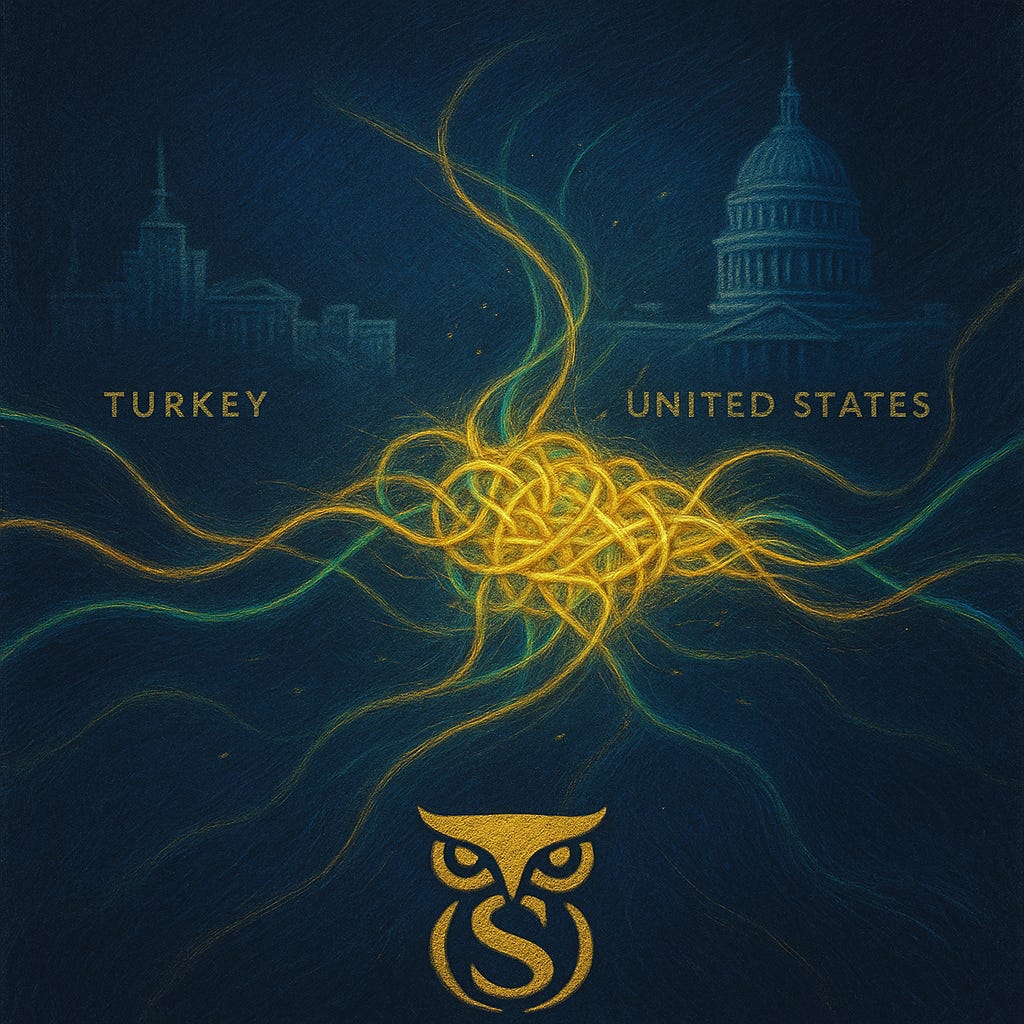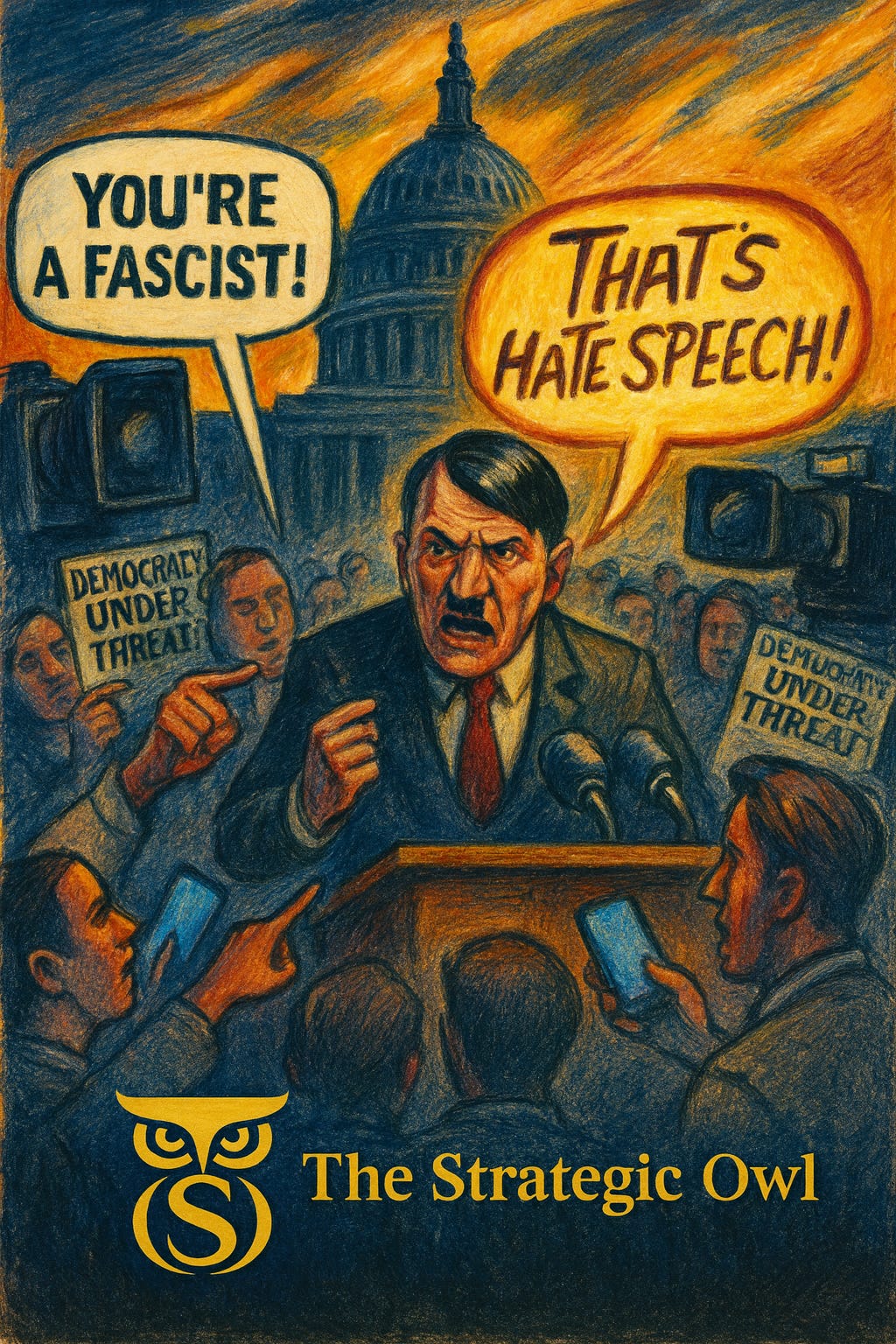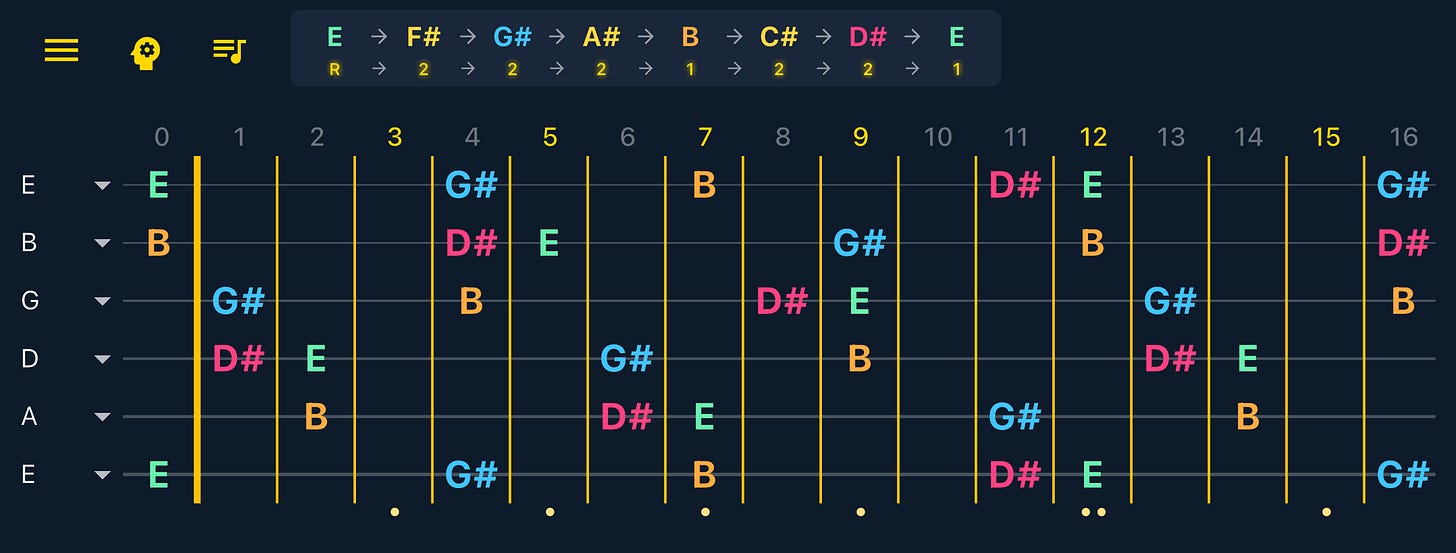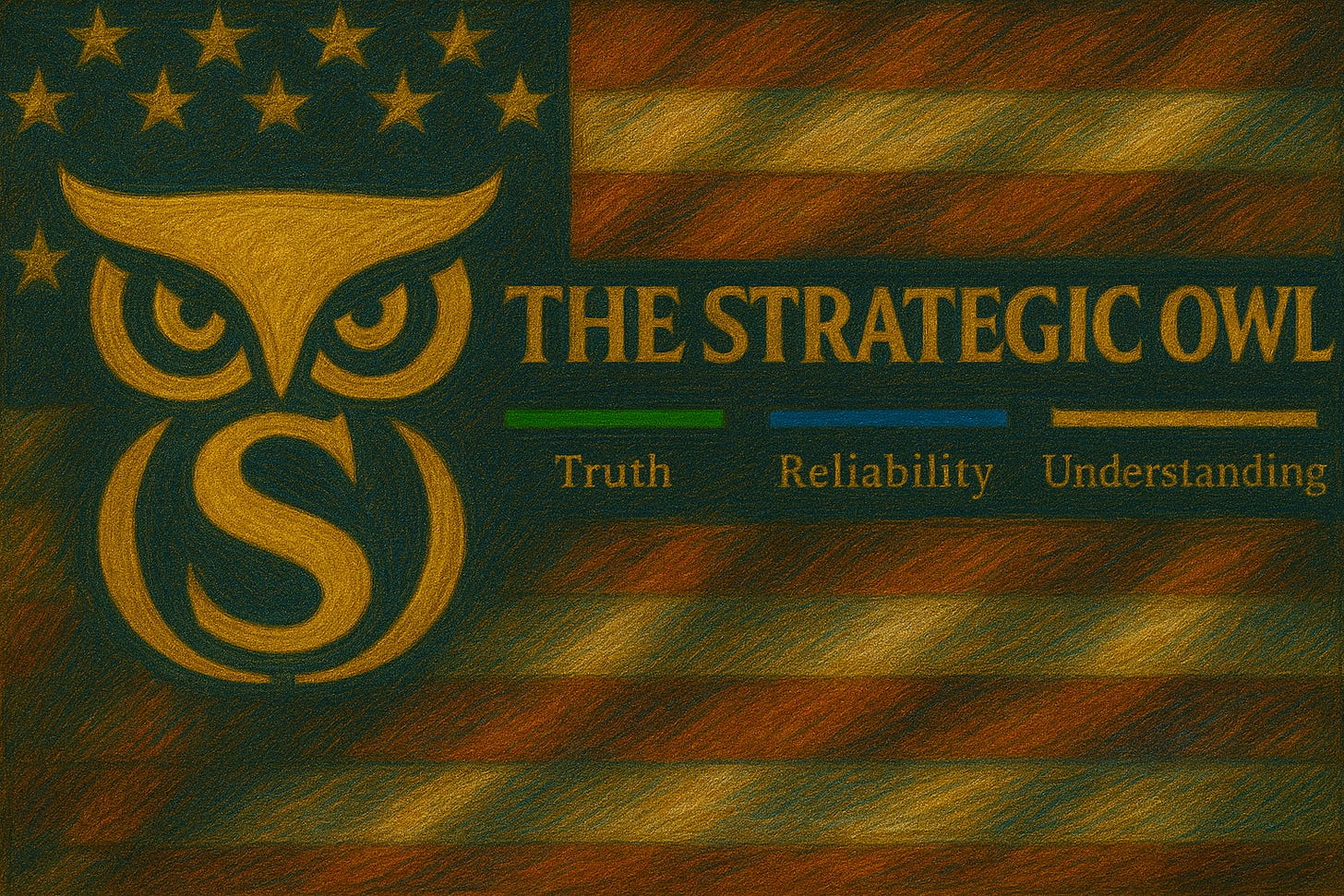Derin Devlet
Subversion. Fear. Projection. Power. Awareness. Resolve.
Hello and welcome, friends.
I know how heavy today feels. Every headline, every argument online, every new controversy seems designed to make us pick sides and tune each other out. And honestly, it works. I’ve felt it too — that sense that everything’s just noise, that politics is too toxic to touch, that it’s safer to look away. But that’s exactly what both our foreign and domestic adversaries want: a country so distracted and divided that we stop paying attention altogether. The more overwhelmed we get, the easier we are to manipulate.
So before anything else, thank you for being here. In a world where attention has become the most valuable commodity we have, choosing to read, to think, and to understand is an act of resistance in itself.
Today I want to talk about a word that’s quietly shaped how millions of Americans see our country: “the deep state.” You’ve probably heard it tossed around in conversations, podcasts, or campaign speeches. Maybe you’ve argued about it with family. Maybe, like me, you’ve even wondered if there really is some hidden hand behind the scenes. That feeling didn’t start with Trump — mistrust in government, media, and institutions has been building for decades. But Trump and his movement found a way to weaponize it, turning doubt into a brand and the phrase “deep state” into a shield against accountability.
If you haven’t yet, I break down how this kind of distrust took root — and how America was ideologically subverted — in my recent piece, The American Subversion.
If this idea is new to you, or if you’ve only heard it used in passing, what follows might help you understand where the term actually came from, how it was designed, and how it’s been repurposed here at home. And if you already know people who believe deeply in it, I hope this gives you something better than frustration — a way to talk about it with understanding instead of anger.
After years of hearing it, researching it, and watching people build their beliefs around it, here’s what I’ve come to understand. The “deep state” once described real covert power in fragile governments, but here in America it’s been re-engineered into a political weapon — a story that turns ordinary public servants into villains and fuels the fantasy that democracy itself is rigged. What began as Cold War propaganda about hidden hands in government has been repurposed to erode faith in every institution that keeps a republic functioning — the press, the courts, and the basic idea of accountability. It’s also projection. The Trump movement has built its own network of loyalty and intimidation — from partisan appointees to paramilitary groups willing to act on its behalf — while insisting that everyone else is part of a secret cabal. Millions now treat this fiction as fact because it offers something simple to hate and someone powerful to trust. That belief isn’t patriotic; it’s ideological conditioning. And as long as we keep chasing shadows, the people shouting “deep state” the loudest will keep benefiting from the chaos it creates.
So let’s talk about where this idea actually comes from. The phrase deep state comes from the Turkish words derin devlet—a term that surfaced in the 1990s after a car crash exposed a secret triangle of power inside Turkey’s own government. In the wreckage were a police chief, a parliament member, and a wanted criminal tied to far-right militias. That single moment revealed what many had whispered about for years: a hidden network linking elements of the military, intelligence services, and organized crime—operating beyond any vote or law. What began as a term for those underground alliances later caught the attention of Western commentators, who used it to describe friction between elected leaders and permanent bureaucracies. In the last couple of decades, the phrase has taken on a different life here in the United States. What once described real shadow networks inside fragile governments became political shorthand—a way to turn disagreement into suspicion and to paint career public servants as part of some hidden plot.
Sources:
https://daily.jstor.org/the-unacknowledged-origins-of-the-deep-state
https://www.boell.de/sites/default/files/Perspectives_1_eng.pdf
https://www.silkroadstudies.org/resources/pdf/SilkRoadPapers/2009_08_SRP_Jenkins_Turkey-Ergenekon.pdf
Today, here in America, the phrase “deep state” has turned into a catch-all for anything that challenges Donald Trump or disrupts his narrative. To many of his followers, it includes intelligence agencies, election officials, judges, journalists, and even names like George Soros—an endless list of supposed enemies said to be working together behind the scenes. I hear it from people I meet and talk with, and not all of them are political. Some are just tired—tired of the noise, tired of not knowing who to trust—and this story gives them something simple to believe: that someone, somewhere, must be pulling the strings.
I understand that feeling because I’ve been there. I first heard the term “deep state” years ago listening to Alex Jones. The way he described it—a cabal of global elites secretly controlling everything—was terrifying. It made the world feel like a stage and the people running it untouchable. For a while, I bought into that fear. It’s an easy hook, because once you believe the system is rigged, every coincidence looks like proof. But over time, I learned how much of that fear depends on keeping people confused and angry. The more powerless you feel, the more you look for someone to blame.
And that’s the trap. It’s not about proof; it’s about emotion. It takes the frustration we all feel and points it at invisible villains. And when people who don’t follow politics start repeating lines like “You can’t trust the media” or “They’re all corrupt,” it shows how deep this has sunk into our culture. That’s exactly what Yuri Bezmenov warned about decades ago—the demoralization stage of ideological subversion. It’s when trust collapses, not because of censorship, but because every source feels contaminated.
I see it happening all around us. When everything feels rigged and everyone seems compromised, it becomes easy to stop believing anything at all. That’s the real danger. The “deep state” story doesn’t need to silence us; it only needs to exhaust us—to make truth feel out of reach and democracy feel pointless. And if we let that happen, the myth wins without ever having to prove itself.
Could you imagine if history’s dictators had enjoyed the same excuse Donald Trump uses today — that “the media” is the enemy? In an age when every major outlet, archive, and primary document sits a search away, the idea of a unified “deep state” controlling the narrative collapses under its own absurdity. We live in the freest information environment humanity has ever known. Anyone with curiosity and a few keywords can verify, cross-check, and compare nearly anything ever published. Yet millions have been taught to believe that every institution, every journalist, and every fact inconvenient to Trump is part of one vast conspiracy. How crazy does that sound?!
This isn’t resistance; it’s regression. The same people who claim to be fighting censorship now rely on the most centralized media machine in modern politics — a network built around loyalty to one man. Fox News didn’t just echo Trump’s message; it became a feeder system for his government. Dozens of its personalities and executives now shape policy inside his second administration. That’s not the mark of a “deep state.” That’s the architecture of propaganda.
When a society with full access to truth chooses grievance over curiosity, it’s not the media that’s been captured — it’s the public. The myth of the deep state survives because it flatters power and excuses apathy. But a republic doesn’t die from hidden hands; it dies when citizens stop using the open ones they already have — the ones that can still type, search, read, and think.
I’m here to do more than point out the problems — I’m here to offer substance and solutions. A goal of The Strategic Owl is to help de-Trumpify America, not by shouting louder, but by giving people language, perspective, and grounding when the conversation gets hijacked by myths like the deep state. These aren’t just talking points; they’re ways to cut through confusion and reach the human being on the other side of the argument.
Here’s where we start:
Listen past the fear. When someone brings up the “deep state,” what they’re often expressing isn’t conspiracy — it’s fear of losing control. Hear that emotion before you argue the facts. Fear can’t be reasoned with until it’s recognized.
Ask, don’t accuse. Instead of saying “that’s not true,” try asking, “What makes you believe that?” or “Where did you hear it?” Curiosity cracks open certainty. It’s not about winning — it’s about inviting them to think past the script.
Spot the projection. Remember: those shouting loudest about a “deep state” often mirror the very control tactics they claim to fight. When you see the deflection — calling others corrupt to hide corruption — call it gently. Reflect, don’t attack.
Refuse the paranoia loop. Conspiracy talk thrives on reaction. When the conversation spirals into blame or “whataboutism,” pull it back to reality: Who benefits from us doubting everything and everyone? The same people telling you there’s a deep state — especially if they’re in power or profiting from the chaos.
Reconnect to reality. Point out what’s verifiable. Government employees aren’t ghosts — they’re people hired, interviewed, and accountable. Facts and transparency exist; they just don’t trend as fast as outrage.
Lead with empathy, not ego. Many who believe this myth aren’t bad — they’re exhausted. They’ve been told for years that everyone’s lying. Patience restores more trust than proof ever will.
Speak as yourself, not as the feed. When these conversations come up, separate your voice from the noise. Don’t sound like a headline or a party line. Share what you’ve noticed, what you’ve read, and how you arrived there. People who live inside the deep state narrative expect you to quote “the media” — proving, in their minds, that you’re programmed. Surprise them. Speak like someone who has thought it through. That’s how you show genuine independence, and it’s how you model what real critical thinking looks like.
Use the tools of the Neonascent Age. After tough talks, step back and reflect. Drop their message into an AI model and ask, “What’s really being said here?” Let technology help you decode tone and motive — not to win the debate, but to understand it.
Breaking free from the deep state illusion doesn’t require a mass movement — it requires awareness, patience, and the courage to think clearly when others are told not to. Each of these steps is also a way out of the Deflectogarchy: the noise machine that thrives on outrage, division, and distraction. And remember — you’re not going to change someone’s mind overnight. Beliefs built over years don’t unravel in one conversation. But every time you stay calm, listen with intention, and respond with clarity instead of hostility, you plant a seed. When we keep showing up that way — questioning without contempt and reconnecting with verifiable reality — we slowly starve that machine of its fuel. That’s how we start rebuilding trust — not through shouting or shaming, but through steady, honest conversations that remind us what shared truth feels like again.
Strategic Insight: If you stop and think about it, the “deep state” collapses under the weight of basic reality. We live in a country with a constitutionally protected free press, public records, whistleblower laws, and an open internet where anyone can post, publish, or expose almost anything. In a world that transparent, the idea of a secret, all-powerful cabal controlling everything is a fairy tale for grown-ups. You can literally verify information yourself, from court filings to congressional reports to financial disclosures—no permission required. And yet, a handful of MAGA media figures want you to believe that they alone have uncovered the truth that every other newsroom, university, and independent journalist somehow missed. Which makes more sense: that thousands of reporters across every outlet are secretly conspiring together, OR that a few opportunists found a way to turn outrage into clicks, money, and power? When you look at it plainly, the “deep state” isn’t deep at all—it’s a shallow grift built on fear, projection, and people who mistake noise for knowledge.
If you really want to see what the “deep state” looks like, look at the people shouting about it. Trump’s movement built its own version—stacked with loyalists in key positions, people whose job depends on denying elections and reality itself. They call everyone else corrupt while surrounding themselves with sycophants and grifters. Their allies in militia circles and online echo chambers aren’t protecting freedom; they’re normalizing intimidation. It’s projection at scale: accuse others of the very thing you’re doing, keep the base angry, and keep the cash flowing.
This is where awareness matters most. Because the people caught in the middle—the apolitical, the exhausted, the ones who just want normal life again—are the ones who can still tip the balance. Talk to them. Share this piece with them. Invite them to read The Strategic Owl and subscribe so these long-form breakdowns reach their inboxes directly. Like the article. Comment on it. Every click and share helps push truth further into the algorithmic stream. It’s not about me—it’s about the message.
And if you want to take this work with you, download The Strategic Owl App — also available on the App Store. It brings everything from the platform straight into your pocket — the T.R.U. Owl Credibility Scores, the full U.S. Constitution, the Insight Quiz, and more — all designed for clarity, transparency, and truth.
As you explore it, I’d love to hear what you think. Your feedback doesn’t just help improve the app — it helps this entire project grow. Every suggestion, bug report, and idea you share shapes how The Strategic Owl evolves into a stronger public resource for critical thinking and civic understanding. This work is meant to serve people, not algorithms — and your input keeps it grounded, human, and useful.
And here’s the part I’m proudest of: it’s completely free. No paywalls, no ads, no tracking, no corporate sponsors. Just independent work built to help people think more clearly and engage more honestly. The easiest way to support this work is to subscribe. It’s free, and it helps these breakdowns reach more people who still care about truth, reliability, and understanding. Share it. Talk about it. Because the more people who stay informed, the harder it is for disinformation to win.
You can explore everything at TheStrategicOwl.com. It’s a space built by one citizen for others who still believe that truth, reliability, and understanding are worth protecting.
If you’d like to help support this work financially, there are two simple ways to do it.
First, I built something you can actually hold onto — The Strategic Fretboard . It’s an app I coded myself for guitarists and bassists who want to see music as a system of logic rather than memorized shapes. For a one-time cost of $12.99, you’re not just supporting The Strategic Owl — you’re getting a tool that teaches connection and pattern recognition, the same principles that guide this platform.
If you play, it’s yours to explore. If you don’t, consider gifting it to a musician you know — maybe even that friend who could use a little harmony in more ways than one. Every download helps keep this publication fully independent and accessible to anyone who wants to think more clearly about the world around them.
Second, if you’d rather contribute directly, you can donate any amount through a secure Stripe link. Every dollar is an investment in the future of this mission — funding new tools, outreach, and ways to grow The Strategic Owl into something even more useful for the public. There are no sponsors, no algorithms, and no strings attached — just independent work built to expand, evolve, and stay free for everyone.
Because this has never been about profit — it’s about participation. Caring enough to read, share, and stay engaged is how we repair what’s been broken. Apathy is what erodes a country; engagement is what rebuilds it.
Thank you for reading and your attention to this matter. 😉
Don’t let apathy win. Fight the good fight, America.
Taylor Irby — October 25th, 2025
Independent Analyst: Data-Driven. Reality-Focused.
https://thestrategicowl.com ← Using Truth to measure credibility.
Android coming soon.









Very thorough discussion of an idea that has been flipped on ordinary Americans - another layer of fear to keep us from speaking out and acting against the wrong.
I particularly appreciated the section “Here’s where we start.” Practical, doable, memorable.